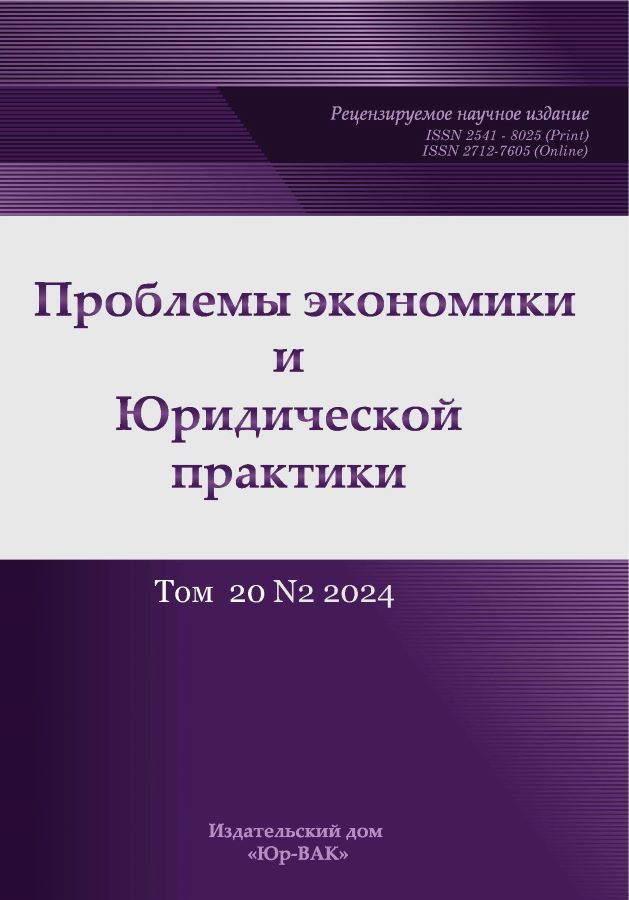Legal Aspects of Development of Innovative Technologies in the Tourism Industry
- Authors: Pavlikov S.G.1, Ermakov D.N.1,2,3
-
Affiliations:
- Financial University under the Government of the Russian Federation
- Institute of China and Contemporary Asia of the Russian Academy of Sciences (IKSA RAS)
- Moscow State University of Technology and Management
- Issue: Vol 20, No 2 (2024)
- Pages: 54-59
- Section: Public Law (State and Legal Sciences)
- URL: https://journals.eco-vector.com/2541-8025/article/view/633698
- DOI: https://doi.org/10.33693/2541-8025-2024-20-2-54-59
- EDN: https://elibrary.ru/CZXZAG
- ID: 633698
Cite item
Abstract
In the modern era of development of innovative technologies digital tools find the widest application in many aspects of life activity of the social organism. Digitalization directly affects the economy, forming a new system of value relations between the subjects of economic and entrepreneurial activity. The article attempts to systematically analyse the application of new creative digital technologies in the tourism industry.
Full Text
About the authors
Sergey G. Pavlikov
Financial University under the Government of the Russian Federation
Email: SPavlikov@fa.ru
ORCID iD: 0000-0001-9385-8548
SPIN-code: 7909-2709
Dr. Sci. (Law), Professor, Head of the Department of Legal Regulation of Economic Activity at the Faculty of Law
Russian Federation, MoscowDmitry N. Ermakov
Financial University under the Government of the Russian Federation; Institute of China and Contemporary Asia of the Russian Academy of Sciences (IKSA RAS); Moscow State University of Technology and Management
Author for correspondence.
Email: dermakow@mail.ru
ORCID iD: 0000-0002-0811-0058
SPIN-code: 6835-3155
Scopus Author ID: 56610014800
ResearcherId: AAS-7807-2020
Dr. Sci. (Econ.), Dr. Sci. (Polit.), Professor, Professor of the Department of Legal Regulation of Economic Activity, Faculty of Law, Chief Scientific Associate of the Centre for World Politics and Strategic Analysis, Professor of the Department of Management and State Municipal Management (Faculty of Management and State Municipal Management), Leading Researcher of the Research and Development Department
Russian Federation, Moscow; Moscow; MoscowReferences
- Federal Law «On the Fundamentals of Tourism Activities in the Russian Federation» from 24.11.1996 N 132-FZ.
- Abdikeev N.M., Bruskin S.N., Kitova O.V. et al. Systems of business efficiency management / Nauk. ed. Abdikeev N.M. and Kitova O.V.: collective monograph. —M.: INFRA-M, 2014. —280 p.
- Allen R. Global economic history: a very brief introduction. —M.: Gaidar Institute Publishing House, 2017. —221 p.
- Amosov A. Issues of transition to the innovative type of reproduction // Ekonomika. 2012. № 5. P. 23–32.
- Asaul V.V., Mikhailova A.O. Ensuring information security in the formation of digital economy // Theory and practice of service: economics, social sphere, technology. 2018. № 4 (38). P. 5–9.
- Bareiko, S.N.; Kozhukhina, K.A. Economic and information security of Russia in the conditions of digital economy // Krasnoyarskaya nauka. 2019. V. 8. № 5. P. 7–18.
- Barinov V.A., Eliferov V.G., Pirimova V.R. Management process of corporate culture development // Economics and Management: problems, solutions. 2017. V. 2. № 8. P. 86–95.
- Basaev Z. V. Digitalisation of the economy: Russia in the context of global transformation // Mir novaya ekonomika. 2018. № 12-4. P. 32–38.
- Bell D. The advent of postindustrial society. —Moscow: Academy, 1999. —783 p.
- Belousov Y.V., Timofeeva O.I. Methodology for determining the digital economy // The World of New Economy. 2019. V. 13. № 4. P. 79–89.
- Bodrunov S.D. The advent of a new industrial society: reset —M.: Cultural Revolution, 2016. —328 p.
- Bruskin S.N. Information-analytical system on the platform of business analytics to support financial planning of sales and services of the corporation // System Administrator. 2016. № 11. P. 86–88.
Supplementary files









